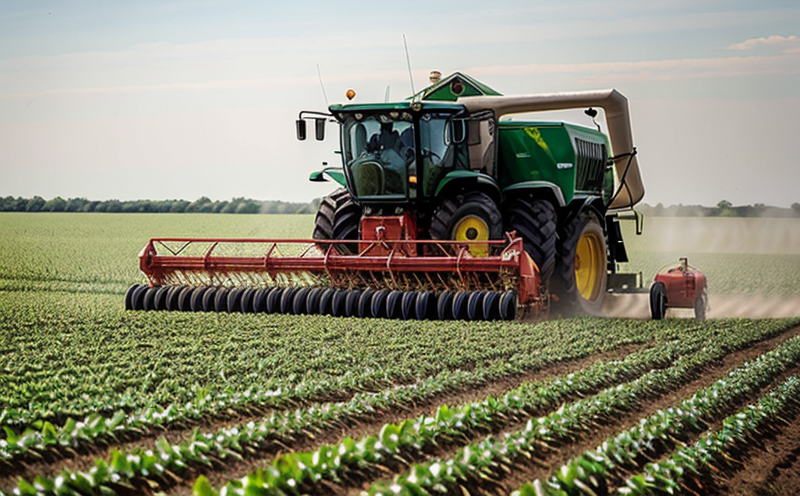Nitrogen Use Efficiency Testing
In agriculture and forestry testing, nitrogen use efficiency (NUE) is a critical parameter that determines how effectively crops utilize applied nitrogen fertilizer. Efficient NUE contributes to sustainable farming practices by minimizing environmental impact and optimizing resource usage. This service involves comprehensive testing to evaluate the uptake, distribution, and utilization of nitrogen in various agricultural and forestry crops.
The goal of this testing is to determine the percentage of nitrogen that is actually used by the crop for growth and development rather than being lost through leaching or denitrification. Efficient NUE ensures that farmers can make informed decisions about fertilizer application, leading to improved yield and reduced costs. Understanding NUE helps in optimizing soil health, enhancing productivity, and reducing the carbon footprint associated with nitrogen use.
The testing process involves several steps including sample collection, preparation, and analysis using advanced analytical techniques such as Dumas combustion for total nitrogen determination and ion chromatography for nitrate and ammonium quantification. The results provide insights into the efficiency of nitrogen uptake by different crop types under various environmental conditions.
Environmental factors like soil pH, temperature, moisture levels, and nutrient availability significantly influence NUE. Testing across diverse environments ensures that farmers can apply this knowledge to their specific agricultural practices. By analyzing these parameters, our laboratory provides reliable data that supports the development of precision agriculture strategies tailored to individual fields.
The importance of accurate testing cannot be overstated; it not only helps in reducing unnecessary nitrogen application but also aids in meeting regulatory requirements and promoting sustainable farming practices. Our expertise lies in providing robust testing solutions that cater to the unique needs of agricultural and forestry sectors, ensuring compliance with international standards such as ISO 17025 for laboratory accreditation.
| Standard Code | Title |
|---|---|
| ISO 17025 | Laboratory Accreditation Requirements |
| ASTM D3947 | Determination of Nitrogen in Fertilizers by Dumas Combustion |
| EN 15026 | Determination of Nitrate and Nitrite in Water by Ion Chromatography |
Environmental and Sustainability Contributions
Nitrogen Use Efficiency Testing plays a pivotal role in achieving sustainable agricultural practices. By optimizing nitrogen utilization, this testing helps reduce the environmental impact associated with excessive fertilizer use. Excess nitrogen can lead to water pollution through runoff into rivers, lakes, and groundwater, contributing to eutrophication which disrupts aquatic ecosystems.
Our testing methods contribute to mitigating these issues by providing precise data on how much nitrogen is actually beneficial for crop growth. This information allows farmers to apply the right amount of fertilizer, thereby minimizing waste and promoting healthier soil conditions. Additionally, efficient NUE enhances biodiversity by supporting more sustainable farming practices.
The reduction in unnecessary nitrogen application also contributes to lower greenhouse gas emissions from agricultural activities. By using less nitrogen, there is a corresponding decrease in nitrous oxide (N2O) production—a potent greenhouse gas with a global warming potential 300 times greater than carbon dioxide over a century.
Moreover, the data generated through our testing supports the development of precision agriculture techniques, which are crucial for sustainable farming. Precision agriculture involves tailoring management practices to individual areas based on soil type, crop variety, and environmental conditions. This approach not only improves yield but also ensures that resources like water and nitrogen are used more efficiently.
Our laboratory’s commitment to accuracy and reliability in testing aligns with broader sustainability goals. By providing reliable data, we empower farmers to make informed decisions that contribute positively to both their operations and the environment.
Use Cases and Application Examples
- Crop Selection: Identify crops with higher NUE for optimal growth in specific soil conditions.
- Fertilizer Management: Determine the most effective timing and quantity of nitrogen application.
- Sustainability Reporting: Comply with environmental reporting requirements by providing accurate data on nitrogen use.
- Precision Agriculture: Develop tailored fertilizer maps for different sections of a farm based on NUE testing results.
In practice, this service can be applied in various scenarios. For instance, in regions prone to water pollution from agricultural runoff, understanding the NUE of crops allows for targeted interventions that reduce nitrogen loss without compromising yield. Another example is in precision agriculture where real-time data on NUE helps farmers adjust their fertilization strategies dynamically.
Furthermore, this testing can be crucial during crop development stages such as seedling establishment and flowering periods when nitrogen demand is high. By monitoring NUE at these critical points, farmers can ensure that crops receive the necessary nutrients for robust growth, which is essential for achieving higher yields in a sustainable manner.
The data from our testing also helps researchers and agricultural scientists to identify genetic markers associated with efficient nitrogen uptake. This knowledge can be used to breed new crop varieties that are more resilient and capable of maximizing their use of applied nitrogen. Such advancements contribute significantly to the long-term sustainability of agriculture by reducing reliance on synthetic fertilizers.





